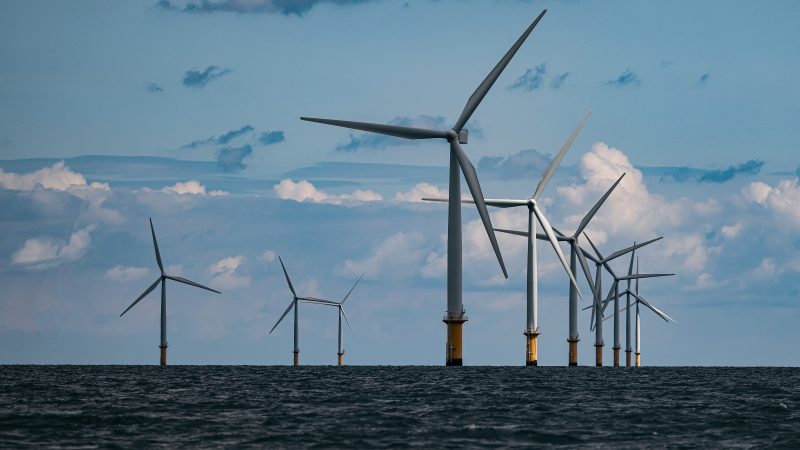
Anyone paying attention to the right of UK politics will have noticed how anti-net zero sentiment is becoming more embedded – culminating with Kemi Badenoch recently declaring that net zero by 2050 is impossible. We’ve also had the spectacle of Reform committing to tax renewable energy and trying to get ‘net stupid zero’ to catch on. And while some of this comes across as lunacy, it would be a mistake to think that they aren’t tapping into a genuine concern people have around the cost of energy.
We have some of the highest energy bills in the world, which rose even further this week after the price cap was increased by another 6% on 1 April – sadly not an April Fool’s joke. For years people have been told that the transition to renewables will bring their bills down, but this clearly isn’t happening yet, and the right of politics are now blaming renewables for higher bills. If we are going to make net zero work for people, they will need to see the difference in their bank account – our outdated and inefficient energy system is holding that back.
‘Renewable energy is made more expensive by the way we price energy’
One of the drivers of our bills is how we price energy. Currently, we have one national price for energy, meaning if you live in gusty Scotland, your bills are no cheaper than someone in the South of England who has never seen a wind turbine. Added to that, the way we price electricity means it is almost always determined by the price of gas, which artificially makes renewable electricity more expensive despite it being cheaper than fossil fuels.
If our housing worked like this, everyone would be paying London rates no matter where you live. In my hometown, Stoke-on-Trent, the average cost for renting is around £650 a month, if our rental market worked like our energy market, that would shoot up to the London average of roughly £2,100. This would obviously be crazy, but this is how our energy pricing works.
‘The energy system we designed has become a fossil’
Our inefficient system has also created the egregious situation where wind generators are paid to turn off their turbines when it’s windy, meaning we have to use gas instead. In the first three months of the year alone we’ve paid almost £400m in constrain payments to turn off turbines and burn gas – and costs from inefficiencies like this go straight onto your energy bill.
This system was designed decades ago around our reliance on coal power plants, but as we’ve started moving away from fossil fuels, the energy system we designed has itself become a fossil.
‘What’s the answer?’
So what’s the answer? We need to reform our energy system and move from national pricing, to a more regional pricing system. Put simply, this would mean that those who live in areas that have more renewable energy, pay less on their energy bills. While places like the South East may see a smaller impact, some projections show that Scotland would go from having the highest energy bills in Europe, to some of the lowest.
These savings come from the fact that a locational system would allow cheap renewables to set the price of energy more often, instead of fossil fuels as we currently do. It is also simply much more efficient, and as we move to a net zero grid with intermittent energy, battery storage, and other clever technologies, we need a smarter, flexible energy system to manage this effectively.
Alleviating the cost-of-living crisis will be crucial for winning the next election, and bringing down energy bills is a vital part of this, but this can also drive the economic growth that the country desperately needs. If people are paying less for energy, they have more money in their pocket. If businesses are paying less for energy bills, they have more money to reinvest and grow.
It would also have the added benefit of incentivising businesses to set up, or move, to other parts of the country – spreading economic growth across the UK. For example, we could see a flurry of data centres setting up in the North of England or Scotland to take advantage of the cheaper energy bills, bringing jobs and growth with them.
The government is currently reviewing whether to follow other countries in adopting a regional system, and a decision is expected this summer. It wouldn’t be fair to pretend this is a silver bullet, and there are genuine concerns from energy generators that the uncertainty from this would impact investment.
But as anti-net zero populism becomes more prominent across the right of UK politics, the only way to counter it is to show how transitioning to clean energy will benefit people – and that means lower bills.
For more from LabourList, subscribe to our daily newsletter roundup of all things Labour – and follow us on Bluesky, WhatsApp, Threads, X or Facebook .
- SHARE: If you have anything to share that we should be looking into or publishing about this story – or any other topic involving Labour– contact us (strictly anonymously if you wish) at [email protected].
- SUBSCRIBE: Sign up to LabourList’s morning email here for the best briefing on everything Labour, every weekday morning.
- DONATE: If you value our work, please chip in a few pounds a week and become one of our supporters, helping sustain and expand our coverage.
- PARTNER: If you or your organisation might be interested in partnering with us on sponsored events or projects, email [email protected].
- ADVERTISE: If your organisation would like to advertise or run sponsored pieces on LabourList‘s daily newsletter or website, contact our exclusive ad partners Total Politics at [email protected].





More from LabourList
Antonia Romeo appointed to lead civil service as new Cabinet Secretary
‘If Labour is serious about upskilling Britain, it must mobilise local businesses’
Stella Tsantekidou column: ‘What are we to make of the Labour Together scandal?’